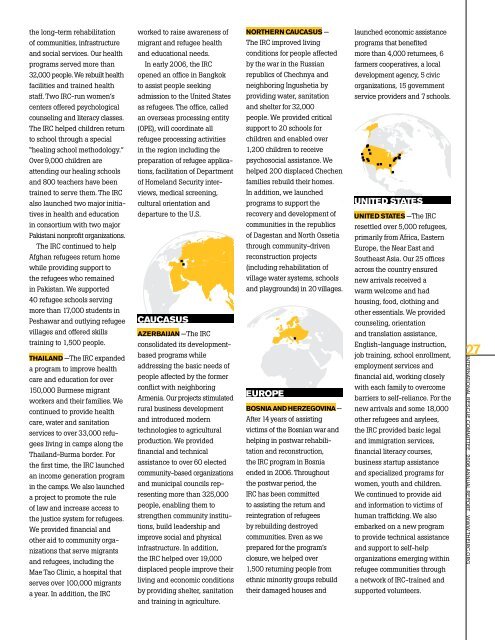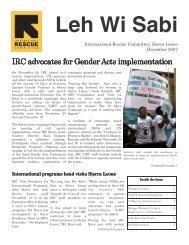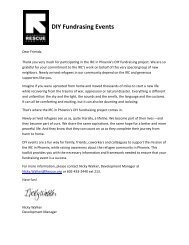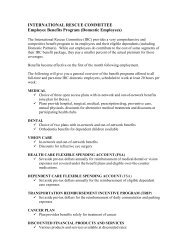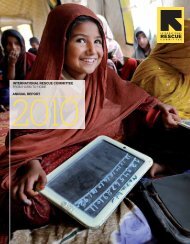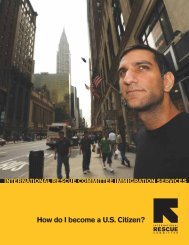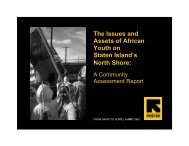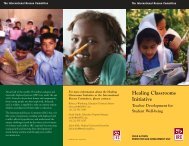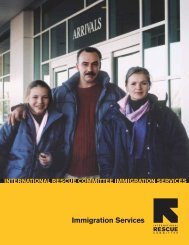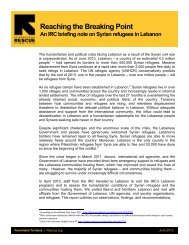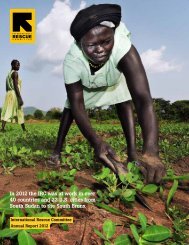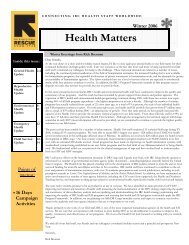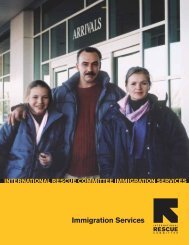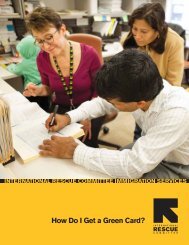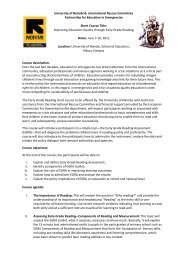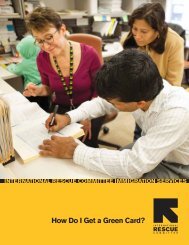International Rescue Committee 2006 Annual Report
International Rescue Committee 2006 Annual Report
International Rescue Committee 2006 Annual Report
Create successful ePaper yourself
Turn your PDF publications into a flip-book with our unique Google optimized e-Paper software.
the long-term rehabilitation<br />
of communities, infrastructure<br />
and social services. Our health<br />
programs served more than<br />
32,000 people. We rebuilt health<br />
facilities and trained health<br />
staff. Two IRC-run women’s<br />
centers offered psychological<br />
counseling and literacy classes.<br />
The IRC helped children return<br />
to school through a special<br />
“healing school methodology.”<br />
Over 9,000 children are<br />
attending our healing schools<br />
and 800 teachers have been<br />
trained to serve them. The IRC<br />
also launched two major initiatives<br />
in health and education<br />
in consortium with two major<br />
Pakistani nonprofit organizations.<br />
The IRC continued to help<br />
Afghan refugees return home<br />
while providing support to<br />
the refugees who remained<br />
in Pakistan. We supported<br />
40 refugee schools serving<br />
more than 17,000 students in<br />
Peshawar and outlying refugee<br />
villages and offered skills<br />
training to 1,500 people.<br />
Thailand —The IRC expanded<br />
a program to improve health<br />
care and education for over<br />
150,000 Burmese migrant<br />
workers and their families. We<br />
continued to provide health<br />
care, water and sanitation<br />
services to over 33,000 refugees<br />
living in camps along the<br />
Thailand-Burma border. For<br />
the first time, the IRC launched<br />
an income generation program<br />
in the camps. We also launched<br />
a project to promote the rule<br />
of law and increase access to<br />
the justice system for refugees.<br />
We provided financial and<br />
other aid to community organizations<br />
that serve migrants<br />
and refugees, including the<br />
Mae Tao Clinic, a hospital that<br />
serves over 100,000 migrants<br />
a year. In addition, the IRC<br />
worked to raise awareness of<br />
migrant and refugee health<br />
and educational needs.<br />
In early <strong>2006</strong>, the IRC<br />
opened an office in Bangkok<br />
to assist people seeking<br />
admission to the United States<br />
as refugees. The office, called<br />
an overseas processing entity<br />
(OPE), will coordinate all<br />
refugee processing activities<br />
in the region including the<br />
preparation of refugee applications,<br />
facilitation of Department<br />
of Homeland Security interviews,<br />
medical screening,<br />
cultural orientation and<br />
departure to the U.S.<br />
CauCasus<br />
Azerbaijan —The IRC<br />
consolidated its developmentbased<br />
programs while<br />
addressing the basic needs of<br />
people affected by the former<br />
conflict with neighboring<br />
Armenia. Our projects stimulated<br />
rural business development<br />
and introduced modern<br />
technologies to agricultural<br />
production. We provided<br />
financial and technical<br />
assistance to over 60 elected<br />
community-based organizations<br />
and municipal councils representing<br />
more than 325,000<br />
people, enabling them to<br />
strengthen community institutions,<br />
build leadership and<br />
improve social and physical<br />
infrastructure. In addition,<br />
the IRC helped over 19,000<br />
displaced people improve their<br />
living and economic conditions<br />
by providing shelter, sanitation<br />
and training in agriculture.<br />
Northern Caucasus —<br />
The IRC improved living<br />
conditions for people affected<br />
by the war in the Russian<br />
republics of Chechnya and<br />
neighboring Ingushetia by<br />
providing water, sanitation<br />
and shelter for 32,000<br />
people. We provided critical<br />
support to 20 schools for<br />
children and enabled over<br />
1,200 children to receive<br />
psychosocial assistance. We<br />
helped 200 displaced Chechen<br />
families rebuild their homes.<br />
In addition, we launched<br />
programs to support the<br />
recovery and development of<br />
communities in the republics<br />
of Dagestan and North Ossetia<br />
through community-driven<br />
reconstruction projects<br />
(including rehabilitation of<br />
village water systems, schools<br />
and playgrounds) in 20 villages.<br />
Europe<br />
Bosnia and Herzegovina —<br />
After 14 years of assisting<br />
victims of the Bosnian war and<br />
helping in postwar rehabilitation<br />
and reconstruction,<br />
the IRC program in Bosnia<br />
ended in <strong>2006</strong>. Throughout<br />
the postwar period, the<br />
IRC has been committed<br />
to assisting the return and<br />
reintegration of refugees<br />
by rebuilding destroyed<br />
communities. Even as we<br />
prepared for the program’s<br />
closure, we helped over<br />
1,500 returning people from<br />
ethnic minority groups rebuild<br />
their damaged houses and<br />
launched economic assistance<br />
programs that benefited<br />
more than 4,000 returnees, 6<br />
farmers cooperatives, a local<br />
development agency, 5 civic<br />
organizations, 15 government<br />
service providers and 7 schools.<br />
United States<br />
United States —The IRC<br />
resettled over 5,000 refugees,<br />
primarily from Africa, Eastern<br />
Europe, the Near East and<br />
Southeast Asia. Our 25 offices<br />
across the country ensured<br />
new arrivals received a<br />
warm welcome and had<br />
housing, food, clothing and<br />
other essentials. We provided<br />
counseling, orientation<br />
and translation assistance,<br />
English-language instruction,<br />
job training, school enrollment,<br />
employment services and<br />
financial aid, working closely<br />
with each family to overcome<br />
barriers to self-reliance. For the<br />
new arrivals and some 18,000<br />
other refugees and asylees,<br />
the IRC provided basic legal<br />
and immigration services,<br />
financial literacy courses,<br />
business startup assistance<br />
and specialized programs for<br />
women, youth and children.<br />
We continued to provide aid<br />
and information to victims of<br />
human trafficking. We also<br />
embarked on a new program<br />
to provide technical assistance<br />
and support to self-help<br />
organizations emerging within<br />
refugee communities through<br />
a network of IRC-trained and<br />
supported volunteers.<br />
27<br />
INTERNATIONAL RESCUE COMMITTEE <strong>2006</strong> ANNUAL REPORT www.theIRC.org


